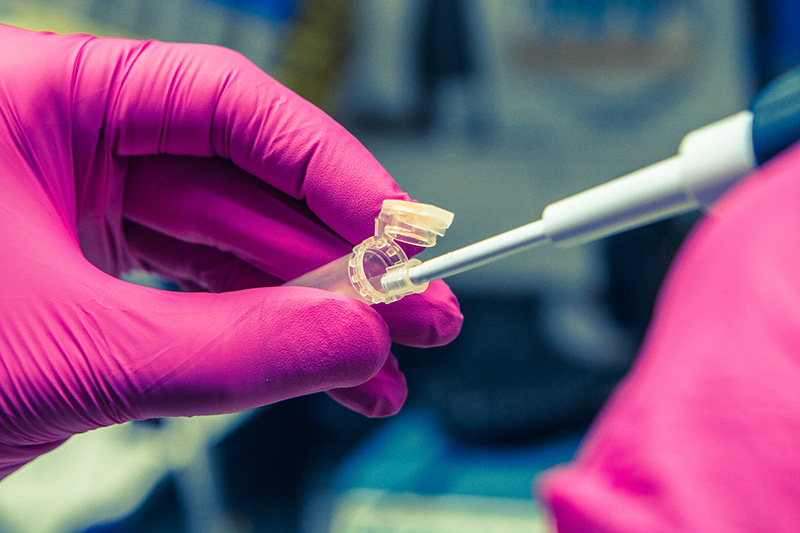EVMS/Sentara collaborative study may benefit breast cancer patients

A just-published study conducted primarily by researchers at Eastern Virginia Medical School and Sentara Healthcare may eventually improve treatments for women with advanced and metastatic breast cancer.
The study demonstrates that two biomarkers, known as SIAH and EGFR, help identify resistant breast-cancer tumors and can differentiate effective from ineffective therapies. This might eventually help physicians predict tumor recurrences and patient survival probabilities during first-line breast-cancer treatments. The study, titled “SIAH and EGFR, Two RAS Pathway Biomarkers, are Highly Prognostic in Locally Advanced and Metastatic Breast Cancer,” was published online in August by EBioMedicine, an online, open-access, peer-reviewed, translational medical journal published with support from The Lancet and Cell Press.
Patients with similar metastatic breast cancers often have dissimilar tumor responses to standard-of-care therapies. The identification of therapy-responsive and prognostic biomarkers will help guide therapies in clinical oncology and personalized medicine.
“This paper addresses one of the most challenging areas of breast cancer treatment,” says William Wasinlenko, PhD, Senior Associate Dean for Research at EVMS, “the diversity of response to therapies in patients with similar types of tumors.”
This study analyzed matched pairs of tumor specimens collected from 182 patients, identified through the Sentara Cancer Registry, who received chemotherapy treatments, surgery and other standard-of-care treatments. Statistical analyses determined whether EGFR/HER2/RAS pathway biomarkers and other clinical predictors, alone and in combination, are prognostic in breast cancer.
“The degree of collaboration in this study among EVMS, the Sentara Cancer Network and other participants was remarkable,” said Richard Hoefer, DO, Surgical Oncologist and Medical Director of the Sentara Cancer Network. “This study will help physicians personalize courses of treatment through the ability to better predict how patients will respond.”
The study’s co-lead authors are Lauren Siewertsz van Reesema, MD Class of 2019; Vasilena Zheleva, MD, EVMS Surgery resident; and Janet Winston, MD, of Sentara Pathology and Pathology Sciences Medical Group, Sentara Norfolk General Hospital.
The study was overseen by principal investigator Amy Tang, PhD, Associate Professor of Microbiology and Molecular Cell Biology at EVMS and a researcher in the EVMS Leroy T. Canoles Jr. Cancer Research Center. Dr. Tang joined EVMS in 2010 after seven years as a faculty member and cancer researcher at the Mayo Clinic.
Additional co-authors include researchers from Mayo Clinic Cancer Center, North Dakota State University, Sentara Cancer Network, Dorothy G. Hoefer Comprehensive Breast Center in Newport News, Sentara CarePlex Hospital in Hampton, Princess Anne High School’s International Baccalaureate Gifted and Talented Program in Virginia Beach, and Virginia Oncology Associates in Newport News.
Dr. Hoefer says EVMS, the Sentara Cancer Network and other institutions are preparing to conduct a similar study of 144 Sentara Cancer Network patients with pancreatic cancer to determine the degree to which these same biomarkers predict outcomes.
“This pioneering research is another reflection of the strong partnership between EVMS and Sentara Healthcare,” says Richard Homan, MD, President and Provost of EVMS and Dean of the School of Medicine. “By working together, we can make great strides in cancer research."